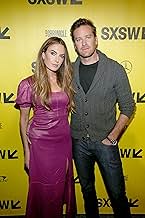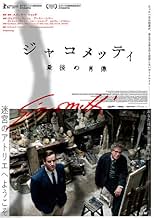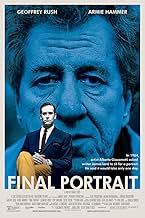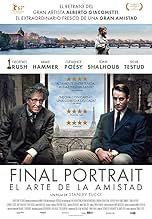IMDb रेटिंग
6.3/10
6.3 हज़ार
आपकी रेटिंग
अपनी भाषा में प्लॉट जोड़ेंThe story of Swiss painter and sculptor Alberto Giacometti.The story of Swiss painter and sculptor Alberto Giacometti.The story of Swiss painter and sculptor Alberto Giacometti.
- पुरस्कार
- कुल 1 नामांकन
Laura Bernardeschi
- Café Customer
- (बिना क्रेडिट के)
Maja Bloom
- French Girl in the Dream
- (बिना क्रेडिट के)
Marina Capasso
- Italian Friend of Giacometti
- (बिना क्रेडिट के)
Laetitia Cazaux
- French Prostitute
- (बिना क्रेडिट के)
Begoña Fernández Martín
- Graveyard Woman
- (बिना क्रेडिट के)
Dolly Jagdeo
- Party Girl
- (बिना क्रेडिट के)
फ़ीचर्ड समीक्षाएं
If you enjoy watching paint dry this is your film. Imagine an artist who is unable to finish a painting without needing to start again
and again. That is the basic premise of Final Portrait (2017). It's a bio-pic that looks into the idiosyncratic mind of renown Swiss artist Alberto Giacometti (Geoffrey Rush) in a story so lacking in forward narrative that many will be left wondering why they watched it at all.
Based on real events, Final Portrait is an adaptation of a memoir by American writer James Lord (Armie Hammer) who is flattered when asked to pose for a portrait by Giacometti. Believing it may be a single session, it turns out to take almost three weeks of daily sittings. The artist lives amidst chaotic mess with a long-suffering wife who tolerates his obsession with a prostitute girlfriend. He hates banks; prefers to hide cash under his studio rubble; has few social filters; and is liked by all despite a tendency insult others. The portrait sessions are constantly interrupted by long walks, drinks at nearby bars, and frequent outbursts due to chronic perfectionism that ensures his works are never finished. He is unable to walk past his clay sculptures without making a change and some are so altered that they are reduced to stick figures. Lord's amused and bewildered fascination with the life of a creative genius keeps him cancelling his return flight to America just to see his final portrait.
The nineteen-day timeframe feels like the same event repeated nineteen times (mercifully, with some time compressions). Along the way, we watch the deeply etched face of the cantankerous Giacometti as he grimaces in self-rebuke, lusts after his girlfriend, and gazes deeply into the gaze of James Lord to search not for the look but the inner soul of another human being. If you can forgive Geoffrey Rush's Aussie-Swiss accent, there is much to admire in his characterisation of an angst-ridden artist. But it is also wearingly repetitive. Lord is the master's foil as the suited slick- back straight guy. Initially adrift in the world of an erratic painter, he is conservative and upright yet his vanity is drawn like a moth to the flame of genius, eager to understand Giacometti's creativity. While both play their part brilliantly, it is Geoffrey Rush who dominates the screen. The studio set is cluttered and claustrophobic, like the artist's mind, and the cinematography employs the shallow depth-of-field effect to dwell on detail, allowing sharply focused faces to peer between blurred works of art as if to say these are but points in time that will never find their final form.
There are clever ironies in watching a painter who studies his subject, while the subject studies the painter. It's a three-way mirror between audience, Rush and Lord. But such existential twists are not enough to elevate this film to a level of great meaning. Viewers enthralled by this field of art might enjoy the story but most others may struggle. It's like a moment in time that lasts nineteen weeks, then compressed into ninety minutes. There is little to look forward to as the ending has no more meaning than the beginning but is far more welcomed.
Based on real events, Final Portrait is an adaptation of a memoir by American writer James Lord (Armie Hammer) who is flattered when asked to pose for a portrait by Giacometti. Believing it may be a single session, it turns out to take almost three weeks of daily sittings. The artist lives amidst chaotic mess with a long-suffering wife who tolerates his obsession with a prostitute girlfriend. He hates banks; prefers to hide cash under his studio rubble; has few social filters; and is liked by all despite a tendency insult others. The portrait sessions are constantly interrupted by long walks, drinks at nearby bars, and frequent outbursts due to chronic perfectionism that ensures his works are never finished. He is unable to walk past his clay sculptures without making a change and some are so altered that they are reduced to stick figures. Lord's amused and bewildered fascination with the life of a creative genius keeps him cancelling his return flight to America just to see his final portrait.
The nineteen-day timeframe feels like the same event repeated nineteen times (mercifully, with some time compressions). Along the way, we watch the deeply etched face of the cantankerous Giacometti as he grimaces in self-rebuke, lusts after his girlfriend, and gazes deeply into the gaze of James Lord to search not for the look but the inner soul of another human being. If you can forgive Geoffrey Rush's Aussie-Swiss accent, there is much to admire in his characterisation of an angst-ridden artist. But it is also wearingly repetitive. Lord is the master's foil as the suited slick- back straight guy. Initially adrift in the world of an erratic painter, he is conservative and upright yet his vanity is drawn like a moth to the flame of genius, eager to understand Giacometti's creativity. While both play their part brilliantly, it is Geoffrey Rush who dominates the screen. The studio set is cluttered and claustrophobic, like the artist's mind, and the cinematography employs the shallow depth-of-field effect to dwell on detail, allowing sharply focused faces to peer between blurred works of art as if to say these are but points in time that will never find their final form.
There are clever ironies in watching a painter who studies his subject, while the subject studies the painter. It's a three-way mirror between audience, Rush and Lord. But such existential twists are not enough to elevate this film to a level of great meaning. Viewers enthralled by this field of art might enjoy the story but most others may struggle. It's like a moment in time that lasts nineteen weeks, then compressed into ninety minutes. There is little to look forward to as the ending has no more meaning than the beginning but is far more welcomed.
I understand that there are people that may have problems with this movie. It can be a frustrating movie to watch. But it can also be, funny, exasperating and sad. The acting is great. I don't place a judgement on the artist's behavior. He was as he was. This movie is about the artistic process, and the collaboration in that process. It can be tedious, chaotic and at times mesmerizing. It reminded me of a few of my friends who are artists. They truly do see the world in a different way, and at times you just have to go with it.
Although in the '60's I knew famous artists could live in hovels, I never imagined the way Alberto Giacometti (Geoffrey Rush), the famous sculptor/painter, lived. In Final Portrait, his grimy Parisian first-floor apartment is strewn with famous spindly-limbed sculptures amid broken pottery and glass with an easel on which he paints a portrait of his friend, James Lord (Armie Hammer).
I am usually critical of stories about painters because these biopics rarely give insight into the artistic process (Girl with a Pearl Earring, Frida, and Pollock among my favorites, but disappointing that way), concentrating rather on the dynamic personal life. However, Final Portrait lets us sit with his subject and ingest the cranky chaos that has already bred world-wide fame.
While his wife Annette Arm (Sylvie Testud), is in attendance, the artist carries on at length with a delightful prostitute, Caroline (Clemence Poesy), goes to dives, disrespects money, chain smokes, and generally acts like the Bohemian he is.
Such seems the stereotype, but writer/director Stanley Tucci deftly adapts Lord's book, A Giacometti Portrait, to let us experience the disarray of the process that takes weeks. The artist is disappointed multiple times, starts over, yet really believes no portrait is ever finished.
Alberto Giacometti keeps us hoping that another day of Lord's sitting will produce a result, yet another day comes and goes into weeks. Lord, a writer, is remarkably patient as we all know genius will not be hurried. When it's over, however, you can bet on its being world-class.
Rush is charming as the disheveled genius, while Hammer is handsome, as always, and subdued in the artist's presence. I was not bored for a second because I felt like a visitor witnessing the workings of chaotic brilliance, a true friendship, and the essence of Parisian artistic life.
Sit back and enjoy an artist at work. It may seem slow, but it's not.
I am usually critical of stories about painters because these biopics rarely give insight into the artistic process (Girl with a Pearl Earring, Frida, and Pollock among my favorites, but disappointing that way), concentrating rather on the dynamic personal life. However, Final Portrait lets us sit with his subject and ingest the cranky chaos that has already bred world-wide fame.
While his wife Annette Arm (Sylvie Testud), is in attendance, the artist carries on at length with a delightful prostitute, Caroline (Clemence Poesy), goes to dives, disrespects money, chain smokes, and generally acts like the Bohemian he is.
Such seems the stereotype, but writer/director Stanley Tucci deftly adapts Lord's book, A Giacometti Portrait, to let us experience the disarray of the process that takes weeks. The artist is disappointed multiple times, starts over, yet really believes no portrait is ever finished.
Alberto Giacometti keeps us hoping that another day of Lord's sitting will produce a result, yet another day comes and goes into weeks. Lord, a writer, is remarkably patient as we all know genius will not be hurried. When it's over, however, you can bet on its being world-class.
Rush is charming as the disheveled genius, while Hammer is handsome, as always, and subdued in the artist's presence. I was not bored for a second because I felt like a visitor witnessing the workings of chaotic brilliance, a true friendship, and the essence of Parisian artistic life.
Sit back and enjoy an artist at work. It may seem slow, but it's not.
The terrific character actor Stanley Tucci is also a terrific director, and for evidence of that look no further than his latest directorial effort, "The Final Portrait."
The film is fact-based, about sculptor and painter Alberto Giacometti (played by Geoffrey Rush), in 1964, toward the end of his career.
The plot revolves around Giacometti inviting author and arts aficionado James Lord (Arnie Hammer) to sit for one of his final portraits _ considered by many to be his last great picture _ at the Paris studio that Giocometti operates with his brother, Diego (Tony Shalhoub).
The result is a finely chiseled character study of the artist and an immensely fascinating depiction of the creative process.
Perfectly understated in every way, from performance to photography, the film is a gently, lilting valentine to all who share in the creative process, in any discipline.
False starts, self-doubt, depression, euphoria _ It's all there.
Rush believably and movingly captures a genius at the end of his days, right down to his shuffling gait and hunched carriage, without overdoing, while Shalhoub, a vastly under appreciated actor, makes every subtle expression and movement poignant and meaningful.
Hammer's young author Lord offers perfect counterpoint, posing questions with a look or gesture, serving as a wide-eyed link between the audience and the man he struggles to understand.
Sylvie Testud as the artist's wife, Annette, brings all the deep love and pain of a complicated relationship in each and every scene, while Clemence Poesy _ recently seen as the icy French detective in the TV series "The Tunnel" _ here shows a distant warmth and complexity as the prostitute who has become the artist's mistress.
The creative process is not a linear or always pretty one, but, as demonstrated here, it is invariably intriguing and can also inspire.
This 90-minute film comes highly recommended.
The film is fact-based, about sculptor and painter Alberto Giacometti (played by Geoffrey Rush), in 1964, toward the end of his career.
The plot revolves around Giacometti inviting author and arts aficionado James Lord (Arnie Hammer) to sit for one of his final portraits _ considered by many to be his last great picture _ at the Paris studio that Giocometti operates with his brother, Diego (Tony Shalhoub).
The result is a finely chiseled character study of the artist and an immensely fascinating depiction of the creative process.
Perfectly understated in every way, from performance to photography, the film is a gently, lilting valentine to all who share in the creative process, in any discipline.
False starts, self-doubt, depression, euphoria _ It's all there.
Rush believably and movingly captures a genius at the end of his days, right down to his shuffling gait and hunched carriage, without overdoing, while Shalhoub, a vastly under appreciated actor, makes every subtle expression and movement poignant and meaningful.
Hammer's young author Lord offers perfect counterpoint, posing questions with a look or gesture, serving as a wide-eyed link between the audience and the man he struggles to understand.
Sylvie Testud as the artist's wife, Annette, brings all the deep love and pain of a complicated relationship in each and every scene, while Clemence Poesy _ recently seen as the icy French detective in the TV series "The Tunnel" _ here shows a distant warmth and complexity as the prostitute who has become the artist's mistress.
The creative process is not a linear or always pretty one, but, as demonstrated here, it is invariably intriguing and can also inspire.
This 90-minute film comes highly recommended.
I wanted to see this movie because I like Geoffrey Rush and Tony Shalhoub. I'd never seen a movie directed by Stanley Tucci, either, so that interested me. I took myself to see this, and expected a semi-art house flick. This was... OK, in my opinion. Here's why:
The Good: The acting is good, which means the directing was good. Well acted and directed in my opinion.
The Bad: There's a bit more than the good, unfortunately. The scenes get a little repetitive after a while, there's a dark color tone to the film that takes a little while to get used to, and I don't feel like you really have a reason to care about the characters. You get left in the dark, just kind of wondering what's taking so long for this man to finish the portrait. He's all over the place. Sometimes studying his drawing, sometimes carousing his mistress, sometimes cursing up a storm. It's an odd situation, watching this film. I didn't dislike it, as some of the other patrons in my theater did, but I don't see a reason to revisit it. So... I'll give it 5/10.
The Good: The acting is good, which means the directing was good. Well acted and directed in my opinion.
The Bad: There's a bit more than the good, unfortunately. The scenes get a little repetitive after a while, there's a dark color tone to the film that takes a little while to get used to, and I don't feel like you really have a reason to care about the characters. You get left in the dark, just kind of wondering what's taking so long for this man to finish the portrait. He's all over the place. Sometimes studying his drawing, sometimes carousing his mistress, sometimes cursing up a storm. It's an odd situation, watching this film. I didn't dislike it, as some of the other patrons in my theater did, but I don't see a reason to revisit it. So... I'll give it 5/10.
क्या आपको पता है
- ट्रिवियाLondon doubled for Paris in the film because they couldn't afford to film in Paris. Filming took place over a week and a half and CGI was used to make it look like Paris. According to Tucci, it was cheaper for a small film to use CGI than to visit the real location.
- भाव
[first lines]
James Lord: [narrating] In 1964, I was a young writer living in Paris. I had written a few articles about Alberto Giacometti, who was one of the most accomplished and respected artists of his generation. I had become good friends with Giacometti and his brother, Diego. And one day, after an exhibition, he asked me to sit for a portrait. He told me it would take no longer than two to three hours. An afternoon at the most.
- कनेक्शनFeatured in Conan: Armie Hammer/Nick Swardson (2018)
- साउंडट्रैकJazz à Gogo
Music by Alain Goraguer
Lyrics by Robert Gall
Published by Editions Bagatelle / EMI Music Publishing Ltd
Performed by France Gall
Courtesy of Polydor Records (France)
Under licence from Universal Music Operations Ltd
टॉप पसंद
रेटिंग देने के लिए साइन-इन करें और वैयक्तिकृत सुझावों के लिए वॉचलिस्ट करें
- How long is Final Portrait?Alexa द्वारा संचालित
विवरण
- रिलीज़ की तारीख़
- कंट्री ऑफ़ ओरिजिन
- आधिकारिक साइटें
- भाषाएं
- इस रूप में भी जाना जाता है
- Фінальний портрет
- फ़िल्माने की जगहें
- Ruby's Bar & Lounge, 76 Stoke Newington Road, लंदन, इंग्लैंड, यूनाइटेड किंगडम(old truck and french restaurant scene)
- उत्पादन कंपनियां
- IMDbPro पर और कंपनी क्रेडिट देखें
बॉक्स ऑफ़िस
- US और कनाडा में सकल
- $4,61,972
- US और कनाडा में पहले सप्ताह में कुल कमाई
- $25,472
- 25 मार्च 2018
- दुनिया भर में सकल
- $16,77,835
- चलने की अवधि1 घंटा 30 मिनट
- रंग
- ध्वनि मिश्रण
- पक्ष अनुपात
- 2.35 : 1
इस पेज में योगदान दें
किसी बदलाव का सुझाव दें या अनुपलब्ध कॉन्टेंट जोड़ें





































